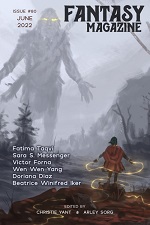“rat/god” by Victor Forna
“Baba Nowruz Gives His Wife a Flower Only Once a Year” by Fatima Taqvi
“The Magical Sow” by Wen Wen Yang
“Potemora in the Triad” by Sara S. Messenger
Reviewed by Victoria Silverwolf
A quartet of imaginative tales appear in this issue.
Less than five hundred words long, “rat/god” by Victor Forna depicts an ordinary married couple who kill a rat in a trap, not knowing that it is a deity. An entire universe emerges from it, and other gods come to mourn its passing.
There is little else to this tiny story than its premise, which provides a half-serious contrast between the mundane and the divine. The text is presented in such a way that the work looks more like a free verse poem than prose, and perhaps that would be the best way to appreciate it.
The narrator of “Baba Nowruz Gives His Wife a Flower Only Once a Year” by Fatima Taqvi hears traditional stories from her mother, but they are changed in ways that give them happier endings. After her mother’s death, the narrator tells these altered tales to children. She encounters a character from one of these stories, enters her home, and changes the way her mythic story ends.
This is only a very superficial summary of a story with multiple layers of meaning. Much of it deals with the nature and power of stories. At one point, the narrator admits that what she has just told the reader is not the truth, adding a further level of complexity. For full appreciation of this work, the reader who is not familiar with certain aspects of Middle Eastern folklore may have to do some research. For some, the story will have exotic appeal, but may remain enigmatic.
“The Magical Sow” by Wen Wen Yang is a brief story about a woman who can talk to her pig. The pair work to free the woman’s sister from an abusive husband. This is a pleasant, if minor, fairy tale, most enjoyable for the sardonic, cynical nature of the pig, who would gladly eat human flesh.
“Potemora in the Triad” by Sara S. Messenger is a very difficult story to describe. It deals with three characters bound together in a strange way. The so-called father seems to be a huge reptilian being. The two characters known as the unfather and the child appear to be mostly, if not entirely, human women. They live inside the father, who wanders around in a way that may keep the world from falling apart. Along the way, the unfather kills creatures who may be gods while shedding teeth. The conclusion suggests that not everything they think they know about their weird existence is true.
As you can tell, I found this story quite confusing. The text frequently consists of very short paragraphs set apart by asterisks, adding to the disjointed feeling. Near the end, the point of view shifts from first person to second person to third person, which only makes things less comprehensible.
If nothing else, the author certainly displays great imagination and originality.
Victoria Silverwolf is often confused.
 Fantasy
Fantasy